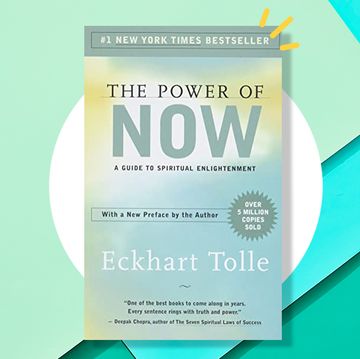Considering how yuck chronic stress can make you feel, it’s no surprise that it can take a toll on your body and mind. Chronic stress can cause a slew of health issues, such as exhaustion, breakouts, and hair loss. So, it’s super important for you to both feel better and learn new strategies for quick stress relief (in addition to implementing long-term solutions like therapy or medication, of course).
If you’re a woman, chances are you take on more day-to-day stressors than men, says Maureen Sayres Van Niel, MD, a psychiatrist and the president of the American Psychiatric Association’s Women's Caucus. "Because [women] continue to shoulder most of the responsibility for nurturing, whether it be of children or elderly relatives, and they continue to have most of the responsibility for caring for the home as well," she says.
Basically, it’s easy to get stressed when your routine consists of waking up, getting yourself and others ready for the day, working, cooking dinner, cleaning, exercising, and the list goes on. (And then doing it all again the next day.) For this reason, learning how to relieve stress and its subsequent physiological responses is especially beneficial for women.
"Fast stress relief can have a significant effect on both your body and your brain," says Kevin Chapman, PhD, a clinical psychologist and the founder and director of the Kentucky Center for Anxiety and Related Disorders. For example, quick ways to chill out can help you decrease your heart rate to normal levels, allow your body to regain homeostasis (or balance), and teach your brain how to manage cortisol levels, Chapman explains. (ICYMI, cortisol is a stress hormone that can be helpful when it's released for short time, but has a negative impact on the body at high levels for extended periods.)
The following are 20 ways to relieve stress in your day-to-day life, according to mental health experts. Try one, or all, of these tricks to start feeling calmer now.
1. Focus on what you can control.
"Engaging in present-focused awareness and what is happening right now is effective for managing strong emotions," Chapman says.
He recommends using a meditation app like Headspace to get you in that self-focused mindset—then move forward with your day with the awareness that you can only control what you do (think: waking up 30 minutes earlier to write, wearing a mask when you go outside, or going for a slow run after work).
2. Label your stress.
Yes, labeling your stress can change the way you respond to it. Specifically, “labeling helps us externalize the stressor,” says WH advisor Chloe Carmichael, PhD, a clinical psychologist in New York. Furthermore, locating the burden of stress on a situation helps make sure that you’re not “merging the stress with the self,” she explains. Or else, the stressor “can actually start to become us, or the fabric of ourselves.”
Plus, when you label an issue—such as I’m stressed about my workload this week—you are putting it into a system and Carmichael points out that language is a system. By describing our stress with words, “we're automatically starting to put stress under control, to classify it, and, on a certain level, take charge of it by talking about it instead of just letting them sit within us,” Carmichael explains. In short, the first step in tackling any stressful issue is identifying it, separating it from yourself, then considering how to move forward.
3. Try this 4-7-8 breathing exercise.
Deep breathing is a quick and easy way to deal with in-the-moment stress, says Dr. Van Niel—and it can even "change the chemistry of your body and mind."
There are literally tons of breathing techniques to choose from, but her go-to is the 4-7-8 method: “Before you begin, let all the air out of your lungs and then take a breath, inhaling for the count of four,” she says. “It’s best to count 'one-thousand-one, one-thousand-two,' to get the full effect." Once you've inhaled, sit still and hold your breath for a count of seven, she says, then, slowly exhale to a count of eight. Do the exercise four times for optimal Zen.
4. Snuggle your face in your dog's fur.
Or say a simple prayer to yourself, or lace up your shoes for a quick walk, or run. The point: Do something that makes you feel relaxed, says Dr. Van Niel. It's also important to remember that everyone is different, so what is a relaxing activity for you might not be so for someone else.
"For some, this is a quick workout, but for others, it's a meditation session," says Dr. Van Niel, adding that reading a favorite book might also be an option. Figure out what works to calm you down, and have it in your back pocket for particularly stressful days.
5. Take an at-home personal day.
Sometimes you might not have the financial backing or availability for a full-on vacation away from home, but prioritizing you time is a necessity, regardless. So, even if you can't leave home, take a personal day to rest and unwind.
Plus, build mini-breaks into your work day whenever you can, in case taking a full day off isn't possible. "Maintaining a schedule and being intentional about protecting individual time is essential for self-care," Chapman says. For example, instead of working past 6 p.m. from your living room couch, cut out early and do something that brings you joy when you can like reading a book or doing a mask.
6. Embrace the mess of it all.
Translation? It’s okay to give yourself a break and take shortcuts when you can—even with something as simple as chopping your own veggies. Go ahead and buy them already cut. Or do something similarly time-saving, like ordering takeout from a local restaurant. If you don't feel like doing your normal blow dry-then-straighten routine, throw it up in a ponytail and call it a day. You'll likely feel less stressed if you embrace the imperfections.
7. Watch Emily in Paris tonight instead of the news.
Sure, it’s good to keep up with current events, but there’s no question that the news can put you on edge. If you find that watching the news is stressing you out, go ahead and take a break from it. Use that time to catch up on your fave guilty-pleasure shows, watch fun YouTube videos, or listen to a podcast. (Or, you know, re-watch Parks and Rec for the thousandth time.)
8. Exercise for at least 20 minutes every day.
Exercise is an amazing stress-reliever. It can lower your blood pressure, improve your sleep, and give you more energy, according to the American Heart Association (AHA).
But you don't need to go all-out in high-intensity training every day to get the benefits: “Even a 20-minute walk, run, swim, or dance session in the midst of a stressful time can give an immediate effect that can last for several hours,” per the American Psychological Association (APA). So, hit the gym for 30 minutes to work off your stress, or try a new fitness class. (WH has a 30-day workout challenge, if you need some inspo.)
9. Do something to make yourself laugh.
Think back to the last time you laughed—and I mean laughed (not just said "LOL" in a text). You probably felt way less stressed in that moment, right?
There's a reason: “People often hold a lot of their stress in their face, and laughs or smiles can help relieve some of that tension,” according to the APA.
That's why Chapman says scheduling time to interact with family on FaceTime or playing with friends on the Nintendo Switch (or other gaming devices) should be a regular activity. Talking to and laughing with family and friends will get rid of those not-so-positive thoughts that can come with feeling isolated and stressed.
10. Learn how to knit.
Or sew, or paint—literally any craft that interests you. The process of creating something can be therapeutic—especially repetitive tasks like knitting, crochet, or cross-stitching.
Researchers found that creating art for 45 minutes noticeably lowered cortisol levels in the saliva of 39 people in a 2016 study in the journal Art Therapy. While it may be frustrating before you get used to your new craft—whether it’s pottery, candle-making, jewelry-making, or something else—making something will help with stress in the long run.
11. Turn on some Ariana Grande.
Many people use music as a means of dealing with emotions—they listen when they're sad, when they're angry, or when they want to get energized—so it makes sense to use music as a way to chill the eff out.
While some will claim that certain types of music (songs with slow, relaxing tempos, for example) are better than others for stress relief, it’s most important that you’re specifically listening to music in order to relax, according to a 2015 study from the journal Psychoneuroendocrinology. Think about it: If you’re turning on the radio because you are deliberately attempting to tone down your stress, you’re likely paying more attention and really trying to de-stress. Do it with intention.
12. Get in downward dog.
Thanks to its combination of physical exercise, stretching, meditation, and deep breathing, yoga is incredible for relieving stress, says the APA. Try to make room for a yoga class or two in your week (there are tons of free options on apps and online too) and take the time to really let go of obligations and negative thoughts.
13. Stop thinking all those negative ruminating thoughts.
This is easier said than done, but it really can help with your stress levels, according to the AHA. It’s necessary to cease ruminating thoughts so you don’t make your stress worse, Carmichael says. Try looking for an action-based way to move forward from this line of thinking.
On the flip side, there's actually a healthy purpose to the awareness you experience via rumination, Carmichael says. Those negative thoughts are there to tell you something is wrong or upsetting you, and that it’s time to take action. Either on your own or while talking with a friend, consider what you can do about this negative emotion, or if you can exercise any control over the situation, Carmichael says. This can take you out of your mind and back into the present and lower your overall stress since you’re, you know, actually trying to fix the situation in whatever way you can.
14. Snag 15 minutes to yourself every single day.
When you’re dealing with coworkers, friends, a partner, and kids all day, every day, it can help to just take a few minutes to yourself each day. Set aside 15 to 20 minutes of me-time every day, the AHA suggests, and do whatever you want. You can simply sit in your car and breathe deeply or listen to music before you go inside for the night or spend that time on your porch with a cup of coffee in the morning—anything that helps you relax.
15. Help others.
We all know it's good to give. But it can seriously help reframe the way you think about what's stressing you out. Helping people who are in a situation worse than yours can help you put your problems into perspective.
If possible, getting groceries for those who aren’t capable, sending words of encouragement via text message, or mailing a letter to a friend just to say you appreciate them can be extremely effective ways to bring your stress levels down, Chapman says. “Although it's not easy, gratitude is an essential attribute to express during times of uncertainty," he adds.
16. Go ahead and leave the party, if you want to.
Some people thrive in social situations like happy hours or Zoom trivia night. Others...not so much.
If you fall into the latter group, one easy way to relieve stress fast is to get out of that uncomfortable situation (and don’t beat yourself up for it later). It’s okay to prefer small, intimate gatherings with friends, says Dr. Van Niel. And hanging out at a party is not worth stressing yourself out all night.
17. Take a bath—but not a bubble bath.
Self-care advocates constantly talk up the relaxation benefits of a hot bubble bath, but science tells us that just floating in a pool of water can be great for stress relief, as well.
Floatation-REST (reduced environmental stimulation therapy) is a specific type of water therapy that involves floating on your back in a pool of water saturated with Epsom salt. Floating in an Epsom salt pool for one hour reduced anxiety in people with anxiety and stress disorders in one 2018 study in the journal PLos One.
Feel free to look for a spa near you that has an Epsom salt pools, or go ahead and relax in a tub filled DIY-style with water and Epsom salts.
18. Add meditation to your routine.
You’ve heard it before because it’s true: Meditation can be majorly beneficial when it comes to lowering your stress levels overall, Carmichael says. “Meditation allows us to focus on something while keeping a certain mental distance from it,” Carmichael says. This means it’s great for when you’re stressed, as it can both pull you out of your mind and be present, while also helping you mitigate stress through breathing techniques and affirmations.
For this reason, Carmichael recommends implementing meditation both in the moment you’re stressed and as a part of your daily routine. “Ideally, you want to meditate before you’re stressed,” Carmichael says, meaning that you want to use it as a way to reduce chronic stress overall by becoming a more mindful person. Pro tip: Try making it a part of your day using helpful apps like Calm, which can send you reminders to meditate in case you forget.
19. Take time for some self-pleasure
ICYMI, having an orgasm is a super helpful way to relieve stress, Carmichael says. “Orgasm and intense pleasure can release dopamine in the body,” she explains. This kind of positive experience—alone or with a partner—can make you feel a sense of security and decreased isolation, Carmichael says, which can instantly make stress better.
In short, consider this your excuse to buy that vibrator you’ve been eyeing, try something new in the bedroom with your partner, or a reason to take a break and focus on yourself. (For your mental health!)
20. Sip on some warm tea.
Yup, it’s time to let that water boil. “Many people find that a mug of steaming hot tea helps them relax a bit and be present in the moment,” Carmichael says. It can create “that sense of warmth and coziness,” she explains, plus the aroma of teas can be super pleasing to the senses.
Need some inspo? Try winding down at the end of the night with some traditionally calming flavors like lavender, mint, or chamomile tea. Add honey for sweetness.
Alexis Jones is an assistant editor at Women's Health where she writes across several verticals on WomensHealthmag.com, including life, health, sex and love, relationships and fitness, while also contributing to the print magazine. She has a master’s degree in journalism from Syracuse University, lives in Brooklyn, and proudly detests avocados.














